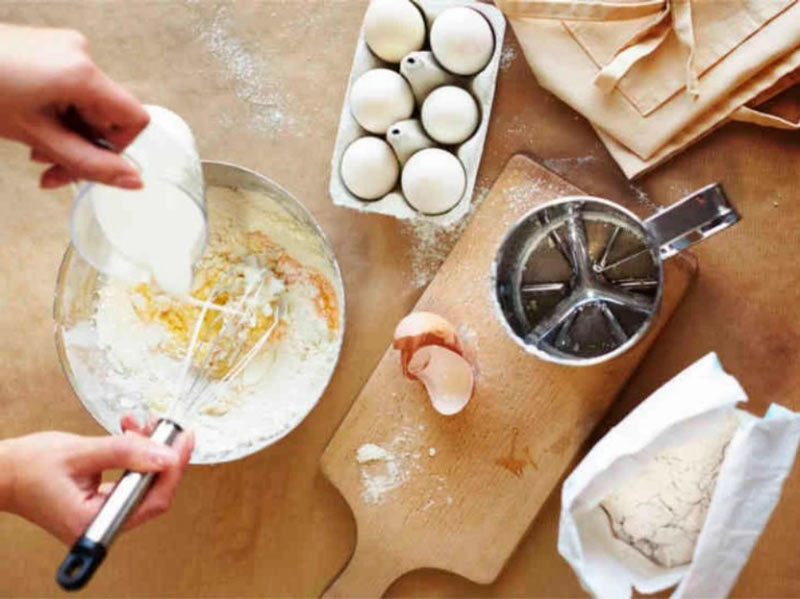Are you looking for a quality substitute for baking powder in your favourite recipes? Baking powder can be expensive, or you’re trying to avoid using certain chemical ingredients. Whatever the reason, several substitutes are available that work just as well, if not better, than baking powder.
This blog post will review five different baking powder substitutes, from common pantry items like vinegar and cream of tartar to other homemade options such as yeast and self-rising flour mixtures.
We'll also discuss when it's best to use one over the other and share some tips on how these alternatives can help ensure a successful cake or bread outcome. Read on to learn more about each substitute.
Overview of baking powder and its uses
In many baked items, baking powder is a popular ingredient. Usually, it consists of starch or flour, baking soda, and an acid (like cream of tartar).
Baking powder releases carbon dioxide gas when it comes into contact with moisture, causing the dough or batter to rise, lightening the final product's texture. Baking powder is also used to make some types of pancakes and other quick bread, such as biscuits and scones.
Substitutes for baking powder

If you don’t have any baking powder on hand or it has expired, there are several substitutes that you can use in its place.
- Yogurt or Buttermilk: For each tsp of baking powder in the recipe, substitute a quarter-cup of plain yogurt or buttermilk.
- Baking Soda and Cream of Tartar: You can substitute your baking powder by combining one part baking soda with one part of tartar. For example, if the recipe calls for one baking powder teaspoon, combine one-half teaspoon of baking soda with one-half teaspoon of cream of tartar.
- Vinegar and Baking Soda: Another option is to combine one part vinegar with one part baking soda. The resulting mixture will foam just like baking powder when exposed to moisture.
- Molasses and Baking Soda: You can also combine one part molasses with two parts baking soda to substitute baking powder. However, this will not create the same light texture as real baking powder, so it is best used in recipes that use very little baking powder or in recipes where the flavor of molasses is an acceptable addition.
Exploring the Chemical Makeup of Baking Powder
Baking powder comprises three components: baking soda, cream of tartar, and cornstarch. Combining all three ingredients creates an acidic reaction in the presence of moisture which causes a leavening effect in baked goods.
When substituting for baking powder, it’s important to understand what each ingredient does and how it affects the overall chemical reaction. When combined with an acid, baking soda, an alkaline substance, releases carbon dioxide gas, which makes the dough rise.
Cream of tartar is a byproduct of wine production and acts as a stabilizing agent for baking soda, helping control the carbon dioxide release rate. Finally, cornstarch absorbs moisture and prevents the acid-alkaline reaction from taking place too quickly.
With the right combination of ingredients, you can recreate the chemical reaction of baking powder to create delicious, fluffy baked goods. Try experimenting with different substitutions, and you’ll be surprised at the results.
Understanding the Role of Cornstarch in Substituting for Baking Powder
When it comes to baking, baking powder is a key ingredient. But if you find yourself without it, other ingredients can be used as substitutes for baking powder. The two most common alternatives are cream of tartar and baking soda.
The cream of tartar and baking soda creates the same leavening effect as a baking powder but with a slightly different flavor. To substitute for one baking powder teaspoon, mix ¼ teaspoon of cream of tartar and ½ teaspoon of baking soda.
Cornstarch is also used in some recipes as a substitute for baking powder. This mainly happens when an acidic ingredient in the recipe reacts with the baking soda, as in a recipe containing buttermilk. Mix one teaspoon of cornstarch and ½ teaspoon of baking soda to substitute for one tsp of baking powder.
The most important thing to remember when substituting for baking powder is that it is a chemical leavening agent and must be replaced with another to achieve the same results. So, when substituting cream of tartar and baking soda or cornstarch and baking soda, measure accurately for the best results in your recipe.
Using Yogurt as an Alternative to Baking Powder
Yogurt is an ideal substitute for baking powder as it has a tangy and acidic quality, similar to what baking powder would provide. To create the same reaction in your batter that baking powder provides, replace the amount of baking powder the recipe calls for with an equal amount of plain yogurt - no other changes are required! Yogurt is an excellent source of calcium and other vitamins and minerals, making it a healthier option for baking.
Exploring the Benefits and Drawbacks of Using Natural Substitutes for Baking Powder

When baking, using high-quality ingredients is important to create the best results. While the store-bought baking powder is an easy and convenient option, some natural alternatives can be substitutes for baking powder.
These natural substitutions offer several benefits over traditional baking powder, such as being free from chemicals, preservatives, and other artificial ingredients. They are also generally easier to find and cheaper than buying baking powder.
However, natural substitutes for baking powder may not always produce the same results as traditional baking powder. For example, cream of tartar is more acidic than baking powder so that it could result in a bitter or sour taste in some recipes. Additionally, cornstarch does not create the same carbon dioxide reaction as baking powder, so it may not work in recipes that require a lot of rise or fluffiness.
FAQs
What may you use in place of 1 tsp of baking powder?
To substitute for one baking powder teaspoon, mix ¼ teaspoon of cream of tartar and ½ teaspoon of baking soda. Alternatively, mix one teaspoon of cornstarch and ½ teaspoon of baking soda.
Can yogurt be used as a substitute for baking powder?
Yes, plain yogurt is an excellent substitute for baking powder. Replace the amount of baking powder the recipe calls for with an equal amount of plain yogurt - no other changes are required.
Are natural substitutes for baking powder as store-bought baking powder?
Natural substitutes for baking powder offer benefits over traditional baking powder, such as being free from chemicals, preservatives, and other artificial ingredients. However, they may not produce the same results as traditional baking powder. For example, cream of tartar is more acidic than baking powder, so it could result in a bitter or sour taste in some recipes.
Conclusion
Making the right substitution for ingredients can make a big difference in the outcome of any baking project, whether it's a cake or bread. Don't be afraid to experiment and learn from mistakes; with practice, you'll soon discover what works best for your baking. Remember that substitutes for baking powder can be used for all sorts of recipes, so don't hesitate to try them out.

Be sure you're getting the right heart rate monitor for your needs. Learn best practices and what to look out for with our definitive guide on buying a quality fitness device.
Apr 13, 2023

Healthy Beans and Legumes You Should Try
Apr 24, 2023

Benefits of Manuka Honey
Apr 20, 2023

Best Foods That Are High In Zinc
Apr 18, 2023

Health Benefits of Gymnema Sylvestre
Apr 26, 2023

Ways to Get Rid of Bloating
Apr 30, 2023

What Are Goji Berries
Apr 18, 2023

Foods That Are High in Vitamin D
Apr 26, 2023

Benefits of Hawthorn Berry
Apr 20, 2023

How to Get Rid of Fluid on The Knee
Jul 30, 2023

Home and Natural Remedies for Toothache Pain
Apr 19, 2023

Are Cheerios Healthy
Apr 18, 2023